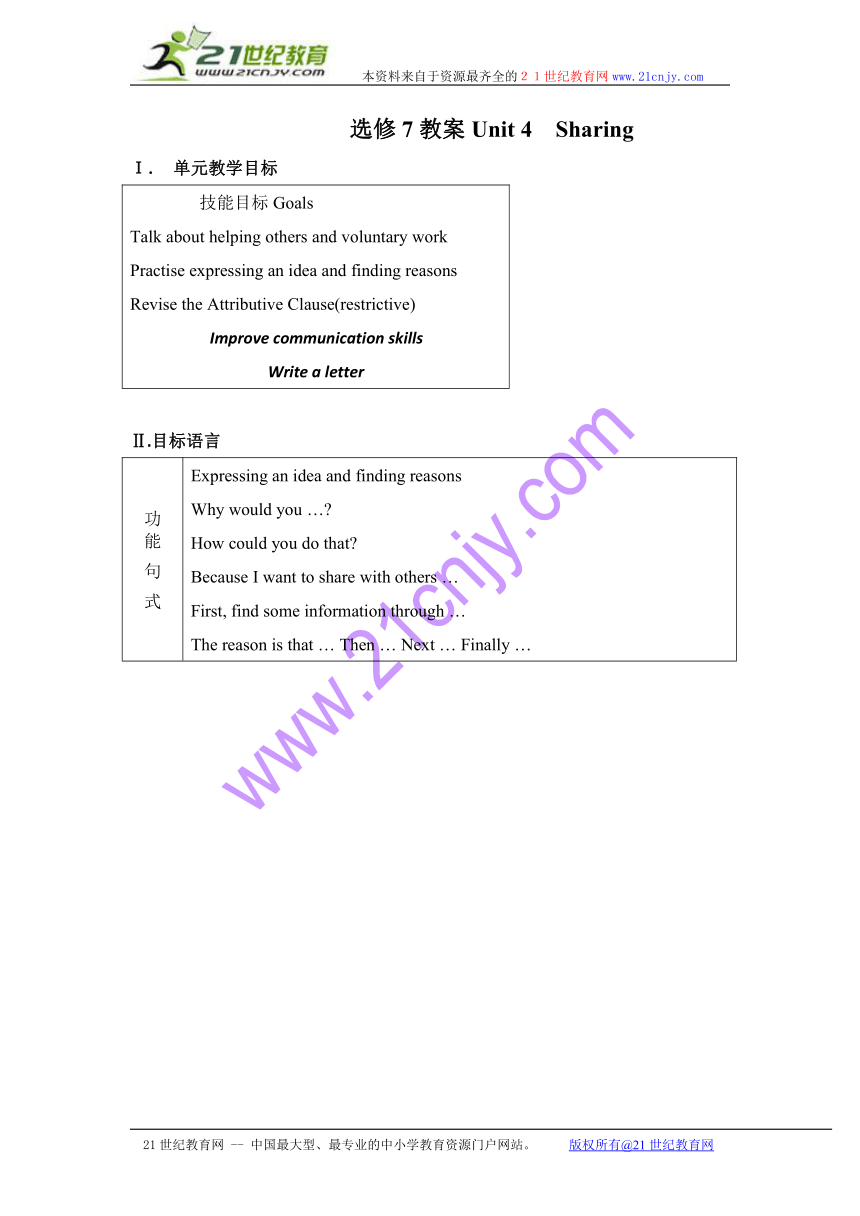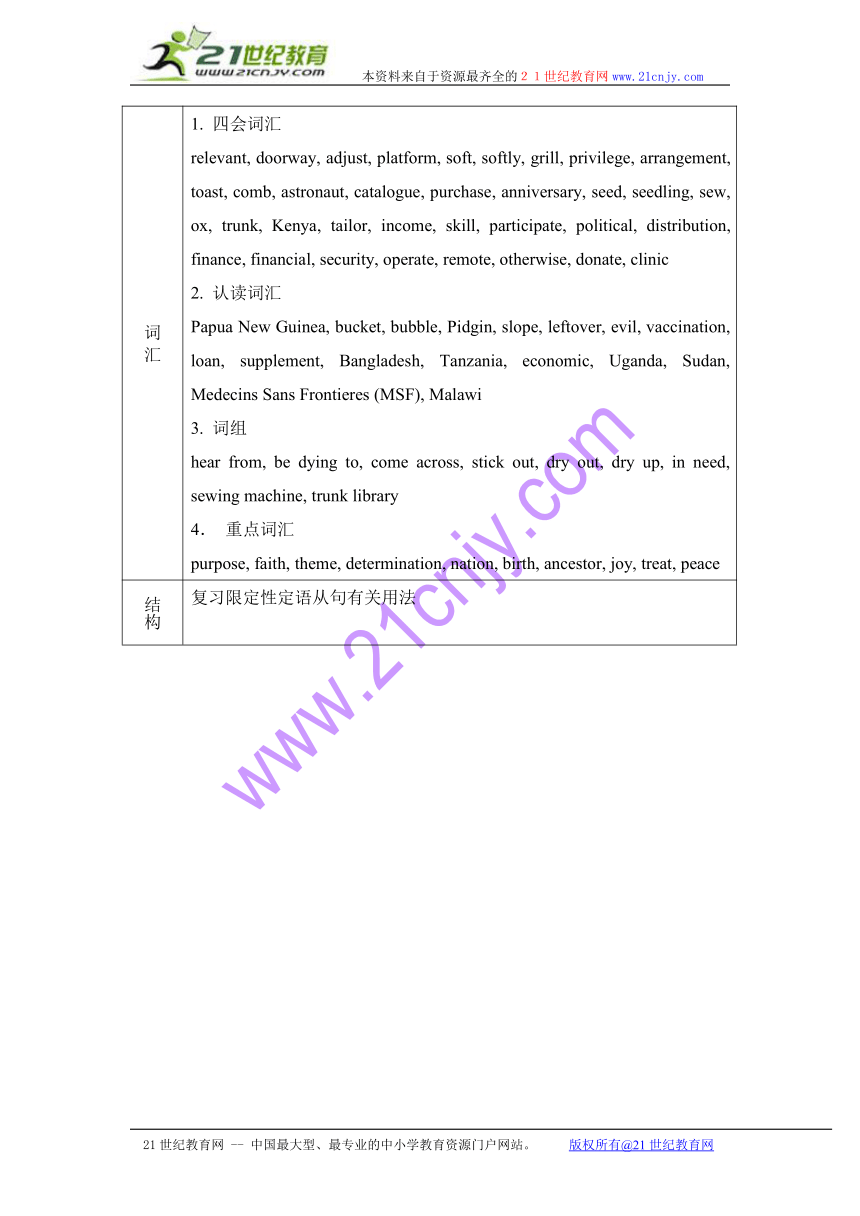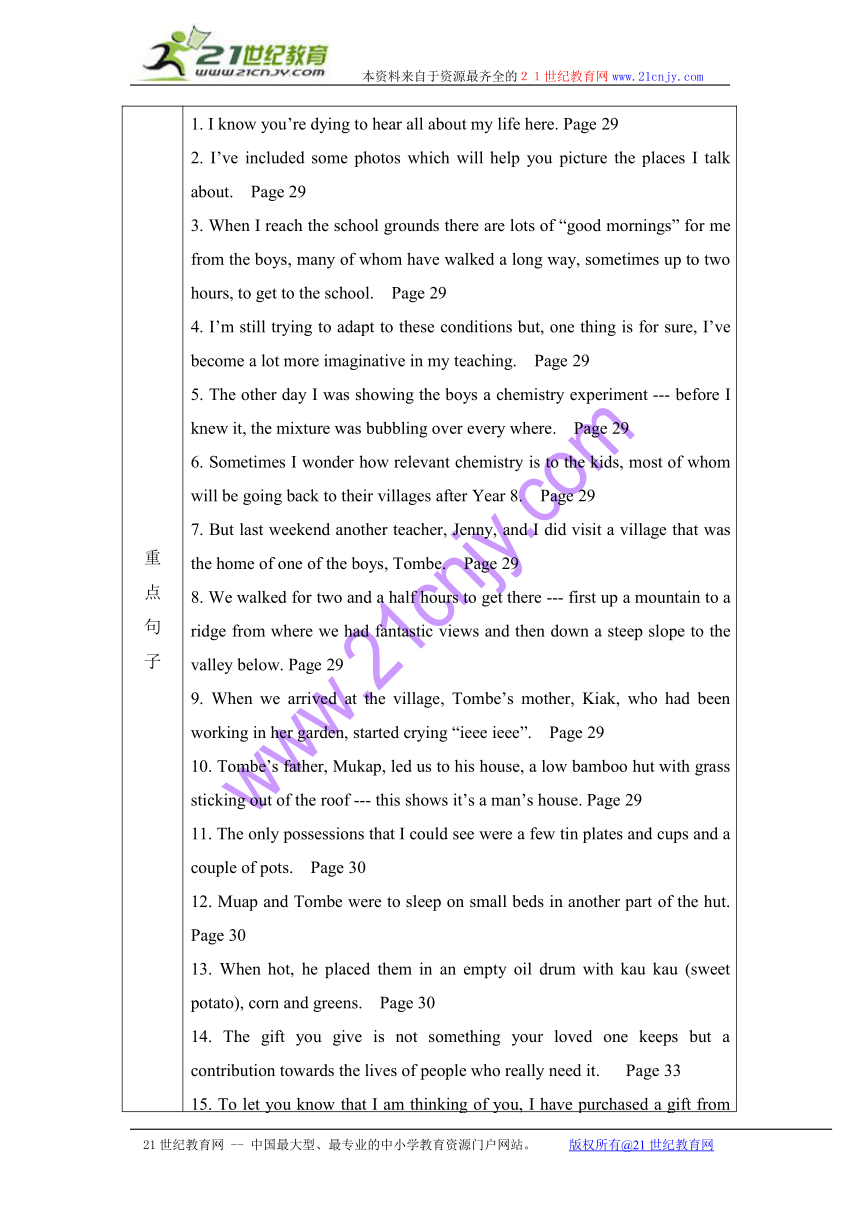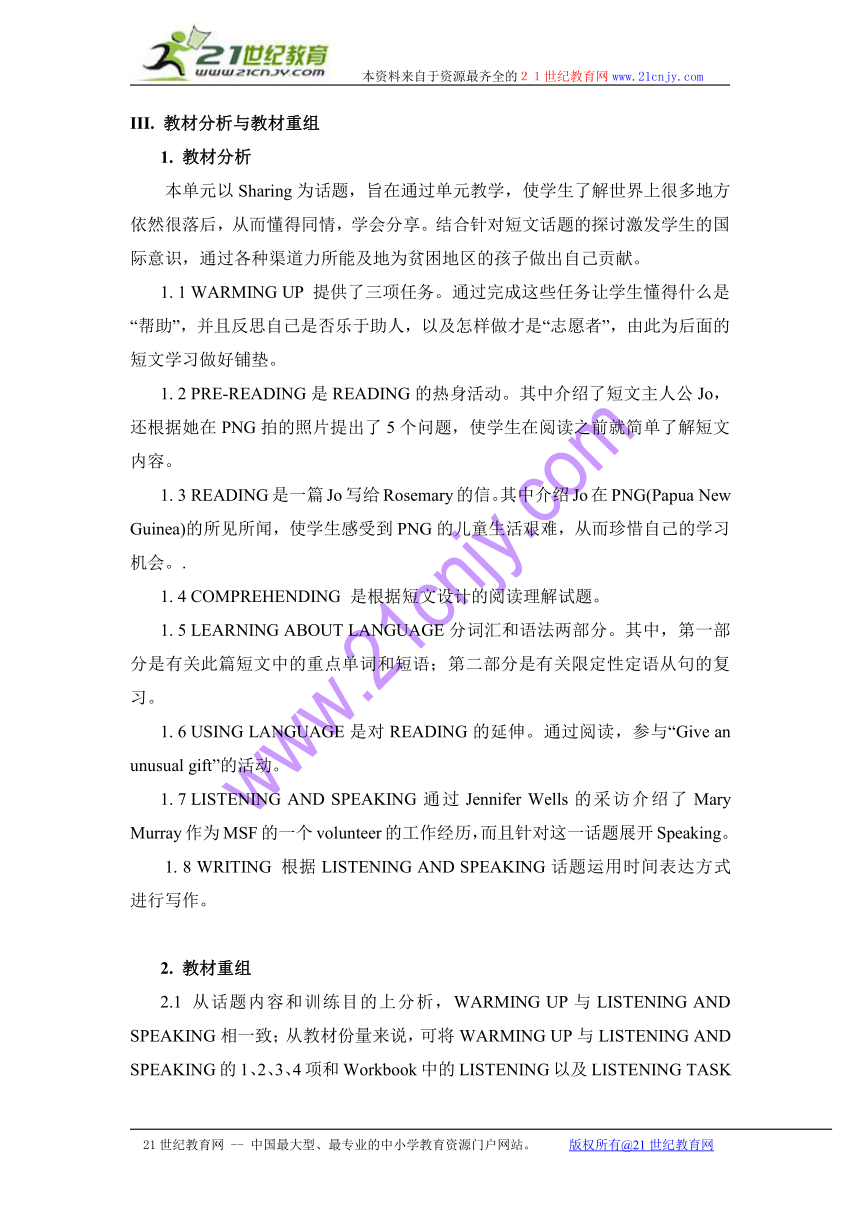unit 4 sharing 单元教案
文档属性
| 名称 | unit 4 sharing 单元教案 |

|
|
| 格式 | rar | ||
| 文件大小 | 19.2KB | ||
| 资源类型 | 教案 | ||
| 版本资源 | 人教版(新课程标准) | ||
| 科目 | 英语 | ||
| 更新时间 | 2010-12-13 00:00:00 | ||
图片预览




文档简介
本资料来自于资源最齐全的21世纪教育网www.21cnjy.com
选修7教案Unit 4 Sharing
I. 单元教学目标
技能目标GoalsTalk about helping others and voluntary workPractise expressing an idea and finding reasonsRevise the Attributive Clause(restrictive) Improve communication skillsWrite a letter
Ⅱ.目标语言
功 能 句 式 Expressing an idea and finding reasonsWhy would you … How could you do that Because I want to share with others …First, find some information through …The reason is that … Then … Next … Finally …
词 汇 1. 四会词汇relevant, doorway, adjust, platform, soft, softly, grill, privilege, arrangement, toast, comb, astronaut, catalogue, purchase, anniversary, seed, seedling, sew, ox, trunk, Kenya, tailor, income, skill, participate, political, distribution, finance, financial, security, operate, remote, otherwise, donate, clinic2. 认读词汇Papua New Guinea, bucket, bubble, Pidgin, slope, leftover, evil, vaccination, loan, supplement, Bangladesh, Tanzania, economic, Uganda, Sudan, Medecins Sans Frontieres (MSF), Malawi 3. 词组hear from, be dying to, come across, stick out, dry out, dry up, in need, sewing machine, trunk library4. 重点词汇purpose, faith, theme, determination, nation, birth, ancestor, joy, treat, peace
结构 复习限定性定语从句有关用法
重 点 句 子 1. I know you’re dying to hear all about my life here. Page 292. I’ve included some photos which will help you picture the places I talk about. Page 293. When I reach the school grounds there are lots of “good mornings” for me from the boys, many of whom have walked a long way, sometimes up to two hours, to get to the school. Page 294. I’m still trying to adapt to these conditions but, one thing is for sure, I’ve become a lot more imaginative in my teaching. Page 295. The other day I was showing the boys a chemistry experiment --- before I knew it, the mixture was bubbling over every where. Page 296. Sometimes I wonder how relevant chemistry is to the kids, most of whom will be going back to their villages after Year 8. Page 297. But last weekend another teacher, Jenny, and I did visit a village that was the home of one of the boys, Tombe. Page 298. We walked for two and a half hours to get there --- first up a mountain to a ridge from where we had fantastic views and then down a steep slope to the valley below. Page 299. When we arrived at the village, Tombe’s mother, Kiak, who had been working in her garden, started crying “ieee ieee”. Page 2910. Tombe’s father, Mukap, led us to his house, a low bamboo hut with grass sticking out of the roof --- this shows it’s a man’s house. Page 2911. The only possessions that I could see were a few tin plates and cups and a couple of pots. Page 3012. Muap and Tombe were to sleep on small beds in another part of the hut. Page 3013. When hot, he placed them in an empty oil drum with kau kau (sweet potato), corn and greens. Page 3014. The gift you give is not something your loved one keeps but a contribution towards the lives of people who really need it. Page 3315. To let you know that I am thinking of you, I have purchased a gift from the World’s Most Useful Gift Catalogue for you to give to some of the world’s poorest. Page 3316. The gift will train a whole village of around 40 families in India, Kenya, or Bangladesh in new agricultural methods, and provide seeds and simple agricultural equipment. Page 33
III. 教材分析与教材重组
1. 教材分析
本单元以Sharing为话题,旨在通过单元教学,使学生了解世界上很多地方依然很落后,从而懂得同情,学会分享。结合针对短文话题的探讨激发学生的国际意识,通过各种渠道力所能及地为贫困地区的孩子做出自己贡献。
1. 1 WARMING UP 提供了三项任务。通过完成这些任务让学生懂得什么是“帮助”,并且反思自己是否乐于助人,以及怎样做才是“志愿者”,由此为后面的短文学习做好铺垫。
1. 2 PRE-READING是READING的热身活动。其中介绍了短文主人公Jo,还根据她在PNG拍的照片提出了5个问题,使学生在阅读之前就简单了解短文内容。
1. 3 READING是一篇Jo写给Rosemary的信。其中介绍Jo在PNG(Papua New Guinea)的所见所闻,使学生感受到PNG的儿童生活艰难,从而珍惜自己的学习机会。.
1. 4 COMPREHENDING 是根据短文设计的阅读理解试题。
1. 5 LEARNING ABOUT LANGUAGE分词汇和语法两部分。其中,第一部分是有关此篇短文中的重点单词和短语;第二部分是有关限定性定语从句的复习。
1. 6 USING LANGUAGE是对READING的延伸。通过阅读,参与“Give an unusual gift”的活动。
1. 7 LISTENING AND SPEAKING通过Jennifer Wells的采访介绍了Mary Murray作为MSF的一个volunteer的工作经历,而且针对这一话题展开Speaking。
1. 8 WRITING 根据LISTENING AND SPEAKING话题运用时间表达方式进行写作。
2. 教材重组
2.1 从话题内容和训练目的上分析,WARMING UP与LISTENING AND SPEAKING相一致;从教材份量来说,可将WARMING UP与LISTENING AND SPEAKING的1、2、3、4项和Workbook中的LISTENING以及LISTENING TASK整合在一起,设计成一节任务型“听力课”。
2.2 将LISTENING AND SPEAKING的5、6项 和Workbook中的TALKING以及SPEAKING TASK整合在一起,设计成一节 "口语课"。
2.3 可将PRE-READING, READING和COMPREHENDING三个活动整合在一起上一节“阅读课(一)”。
2.4 可将LEARNING ABOUT LANGUAGE的词汇和语法两部分与Workbook中的USING WORDS AND EXPRESSIONS与USING STRUCTURES整合在一起上一节“语法课”。
2.5 可将USING LANGUAG中Give an unusual gift, 和Workbook中READING TASK的A LETTER FROM PLAN整合起来上一节“阅读课(二)(泛读课)”。
2.6 将WRITING和Workbook中WRITING TASK整合成一节“写作课”。
3. 课型设计与课时分配(经教材分析,根据学情,本单元可以用六课时教完)
1st period 听力课
2nd period 口语课
3rd period 阅读课
4th period 语法课
5th period 泛读课
6th period 写作课
Ⅳ. 分课时教案
The First Period Listening
Teaching goals 教学目标
1. Target language目标语言
a.词汇和短语:
volunteer, clinic, challenging, over the last few years, in the future, in two weeks’ time, a couple of, developing country, Medecins Sans Frontieres(MSF), Malawi, Sudan, The Fred Hollows Foundation, The Cancer Council, Youth in the city, go blind, belief
b. 重点句子:
Why did Mary decide to work in the developing countries
Why were conditions in the clinic in the Sudan challenging
In the Sudan, why was it nearly impossible for Mary to get to the clinics when the rains came
2. Ability goals能力目标
Improve the students’ listening ability by listening to Dr Mary Murray’s experience as a volunteer with Medecins Sans Frontieres (MSF)
3.Learning ability goals学能目标
Learn to predict what will be heard.
Help the students understand time expressions and use them.
Teaching important point 教学重点
Learn to make notes while listening to the material and number the events in the order they are heard.
Teaching difficult point 教学难点
Learn to use time expressions and work together with a partner to describe a person’s experience..
Teaching methods 教学方法
Listening and cooperative learning.
Teaching aid 教具准备
A recorder
Teaching procedures & ways 教学过程与方式
Listening and cooperative learning.
Step I Warming Up
1. Greetings
T: Good morning /afternoon everyone!
Ss: Good morning /afternoon, Sir/ Madam!
T: Have you ever helped others What did you do to help your parents Or other relatives Or your friends Or people in your community Or people outside your community I’m sure you have a lot to say. Ok, let divide into groups of three and finish the survey form. Then in groups, discuss whether someone who helps the groups on the survey form can be called a “volunteer”.
Suggested answers:
What do you do to help… Name: Tom Name: Helen Name: Mary
1. your parents Clean the floor Wash dishes Prepare supper
2. other relatives Lend my books and CDs to them Take care of my cousin while his parents are away Comfort them when they are sad
3. your friends Repair their computers Help them with the lessons Accompany them to do shopping
4. people in your community Be a coach of the football lovers Sing and dance for the elders Help my neighbours carry things home
5. people outside your community Plant trees Help people with disabilities Return the wallet to the loser
T: Which one can be called a volunteer Or what kind of things do volunteers do
S: Volunteer work includes: Be a coach of the football lovers, plant trees, help people with disabilities.
T: Correct. Only those who don’t work not for rewards – especially money and materials, and not forced to do so are volunteers. And not only the person but also the society and the environment benefit from it. For example, Dr Mary Murray was a volunteer with Medecins Sans Frontieres(MSF). Now turn to Page 35, read Exercises 1 and 2, and predict what you will hear in the listening material. You can also discuss with your partner.
Sa: Now Jennifer Wells is interviewing Dr Mary Murray about what has happened in Mary’s life.
Sb: She once worked in a clinic in Malawi and Sudan.
Sc: Malawi and Sudan are developing countries.
Sd: Many children died when she worked in Malawi.
Se: Conditions in the clinics in the Sudan were very terrible and challenging.
Sf: Medecins Sans Frontieres(MSF) is an organization that provide free medical care to children in poor countries.
T: Very good. You see, even without listening to the dialogue you can get much information, if you study the questions carefully. Now let’s listen to their dialogue. You will pay attention to the time expressions and number them in the order you hear them. (Show the 11 time expressions on Page 35). And also you will answer as many of the questions in Exercise 2 as you can.
Step II Listening(I)
(The teacher plays the tape and the students listen to it.)
T: Now let’s check the answers of Exercise 1 and 2.
(The students will answer the questions)
T: Now let’s listen to the dialogue for a second time. When you are listening, you can check the answers of Exercise 2 and finish Exercises 3 and 4. Learn to make notes about Mary’s experiences in the table on Page 35. And share your notes with your partner and then with other groups.
(The students will makes notes, and share their notes.)
T: Ok, let’s listen to it for a third time to check the notes.
Step III Listening(II)
T: Perhaps you may wonder, because we are students, what we can do to help. That is, what can we do to serve communities outside the school Ok, let do LISTENING in the workbook on Page 70. You are also required to predict what you will hear, according to the four questions.
Sa: There are three characters in the material: Jason, Mick and Annie.
Sb: They want to raise money to help.
Sc: Perhaps they will help children in hospital, or serve soup to the homeless, or protect the environment.
Sd: They will spend some time working for their school’s Community Care Committee (CCC).
T: It couldn’t be better. Now we’ll listen and check our prediction and also finish the exercises on Page 70.
Step V Assignment
T: Boys and girls, today we have listened to two materials about giving help to others. I do hope all of us will help those who need help. Besides, you should learn to predict what you will hear before listening and pay attention to the time expressions while listening.
Homework for today.
1. Finish the LISTENING TASK on Page 75-76. Remember to predict what you will hear according to the given information and also pay attention to time expressions.
2. Google for more information about MSF and share it between us.
Now class is over. Goodbye, everyone.
Ss: Goodbye, sir/madam.
21世纪教育网 -- 中国最大型、最专业的中小学教育资源门户网站。 版权所有@21世纪教育网
选修7教案Unit 4 Sharing
I. 单元教学目标
技能目标GoalsTalk about helping others and voluntary workPractise expressing an idea and finding reasonsRevise the Attributive Clause(restrictive) Improve communication skillsWrite a letter
Ⅱ.目标语言
功 能 句 式 Expressing an idea and finding reasonsWhy would you … How could you do that Because I want to share with others …First, find some information through …The reason is that … Then … Next … Finally …
词 汇 1. 四会词汇relevant, doorway, adjust, platform, soft, softly, grill, privilege, arrangement, toast, comb, astronaut, catalogue, purchase, anniversary, seed, seedling, sew, ox, trunk, Kenya, tailor, income, skill, participate, political, distribution, finance, financial, security, operate, remote, otherwise, donate, clinic2. 认读词汇Papua New Guinea, bucket, bubble, Pidgin, slope, leftover, evil, vaccination, loan, supplement, Bangladesh, Tanzania, economic, Uganda, Sudan, Medecins Sans Frontieres (MSF), Malawi 3. 词组hear from, be dying to, come across, stick out, dry out, dry up, in need, sewing machine, trunk library4. 重点词汇purpose, faith, theme, determination, nation, birth, ancestor, joy, treat, peace
结构 复习限定性定语从句有关用法
重 点 句 子 1. I know you’re dying to hear all about my life here. Page 292. I’ve included some photos which will help you picture the places I talk about. Page 293. When I reach the school grounds there are lots of “good mornings” for me from the boys, many of whom have walked a long way, sometimes up to two hours, to get to the school. Page 294. I’m still trying to adapt to these conditions but, one thing is for sure, I’ve become a lot more imaginative in my teaching. Page 295. The other day I was showing the boys a chemistry experiment --- before I knew it, the mixture was bubbling over every where. Page 296. Sometimes I wonder how relevant chemistry is to the kids, most of whom will be going back to their villages after Year 8. Page 297. But last weekend another teacher, Jenny, and I did visit a village that was the home of one of the boys, Tombe. Page 298. We walked for two and a half hours to get there --- first up a mountain to a ridge from where we had fantastic views and then down a steep slope to the valley below. Page 299. When we arrived at the village, Tombe’s mother, Kiak, who had been working in her garden, started crying “ieee ieee”. Page 2910. Tombe’s father, Mukap, led us to his house, a low bamboo hut with grass sticking out of the roof --- this shows it’s a man’s house. Page 2911. The only possessions that I could see were a few tin plates and cups and a couple of pots. Page 3012. Muap and Tombe were to sleep on small beds in another part of the hut. Page 3013. When hot, he placed them in an empty oil drum with kau kau (sweet potato), corn and greens. Page 3014. The gift you give is not something your loved one keeps but a contribution towards the lives of people who really need it. Page 3315. To let you know that I am thinking of you, I have purchased a gift from the World’s Most Useful Gift Catalogue for you to give to some of the world’s poorest. Page 3316. The gift will train a whole village of around 40 families in India, Kenya, or Bangladesh in new agricultural methods, and provide seeds and simple agricultural equipment. Page 33
III. 教材分析与教材重组
1. 教材分析
本单元以Sharing为话题,旨在通过单元教学,使学生了解世界上很多地方依然很落后,从而懂得同情,学会分享。结合针对短文话题的探讨激发学生的国际意识,通过各种渠道力所能及地为贫困地区的孩子做出自己贡献。
1. 1 WARMING UP 提供了三项任务。通过完成这些任务让学生懂得什么是“帮助”,并且反思自己是否乐于助人,以及怎样做才是“志愿者”,由此为后面的短文学习做好铺垫。
1. 2 PRE-READING是READING的热身活动。其中介绍了短文主人公Jo,还根据她在PNG拍的照片提出了5个问题,使学生在阅读之前就简单了解短文内容。
1. 3 READING是一篇Jo写给Rosemary的信。其中介绍Jo在PNG(Papua New Guinea)的所见所闻,使学生感受到PNG的儿童生活艰难,从而珍惜自己的学习机会。.
1. 4 COMPREHENDING 是根据短文设计的阅读理解试题。
1. 5 LEARNING ABOUT LANGUAGE分词汇和语法两部分。其中,第一部分是有关此篇短文中的重点单词和短语;第二部分是有关限定性定语从句的复习。
1. 6 USING LANGUAGE是对READING的延伸。通过阅读,参与“Give an unusual gift”的活动。
1. 7 LISTENING AND SPEAKING通过Jennifer Wells的采访介绍了Mary Murray作为MSF的一个volunteer的工作经历,而且针对这一话题展开Speaking。
1. 8 WRITING 根据LISTENING AND SPEAKING话题运用时间表达方式进行写作。
2. 教材重组
2.1 从话题内容和训练目的上分析,WARMING UP与LISTENING AND SPEAKING相一致;从教材份量来说,可将WARMING UP与LISTENING AND SPEAKING的1、2、3、4项和Workbook中的LISTENING以及LISTENING TASK整合在一起,设计成一节任务型“听力课”。
2.2 将LISTENING AND SPEAKING的5、6项 和Workbook中的TALKING以及SPEAKING TASK整合在一起,设计成一节 "口语课"。
2.3 可将PRE-READING, READING和COMPREHENDING三个活动整合在一起上一节“阅读课(一)”。
2.4 可将LEARNING ABOUT LANGUAGE的词汇和语法两部分与Workbook中的USING WORDS AND EXPRESSIONS与USING STRUCTURES整合在一起上一节“语法课”。
2.5 可将USING LANGUAG中Give an unusual gift, 和Workbook中READING TASK的A LETTER FROM PLAN整合起来上一节“阅读课(二)(泛读课)”。
2.6 将WRITING和Workbook中WRITING TASK整合成一节“写作课”。
3. 课型设计与课时分配(经教材分析,根据学情,本单元可以用六课时教完)
1st period 听力课
2nd period 口语课
3rd period 阅读课
4th period 语法课
5th period 泛读课
6th period 写作课
Ⅳ. 分课时教案
The First Period Listening
Teaching goals 教学目标
1. Target language目标语言
a.词汇和短语:
volunteer, clinic, challenging, over the last few years, in the future, in two weeks’ time, a couple of, developing country, Medecins Sans Frontieres(MSF), Malawi, Sudan, The Fred Hollows Foundation, The Cancer Council, Youth in the city, go blind, belief
b. 重点句子:
Why did Mary decide to work in the developing countries
Why were conditions in the clinic in the Sudan challenging
In the Sudan, why was it nearly impossible for Mary to get to the clinics when the rains came
2. Ability goals能力目标
Improve the students’ listening ability by listening to Dr Mary Murray’s experience as a volunteer with Medecins Sans Frontieres (MSF)
3.Learning ability goals学能目标
Learn to predict what will be heard.
Help the students understand time expressions and use them.
Teaching important point 教学重点
Learn to make notes while listening to the material and number the events in the order they are heard.
Teaching difficult point 教学难点
Learn to use time expressions and work together with a partner to describe a person’s experience..
Teaching methods 教学方法
Listening and cooperative learning.
Teaching aid 教具准备
A recorder
Teaching procedures & ways 教学过程与方式
Listening and cooperative learning.
Step I Warming Up
1. Greetings
T: Good morning /afternoon everyone!
Ss: Good morning /afternoon, Sir/ Madam!
T: Have you ever helped others What did you do to help your parents Or other relatives Or your friends Or people in your community Or people outside your community I’m sure you have a lot to say. Ok, let divide into groups of three and finish the survey form. Then in groups, discuss whether someone who helps the groups on the survey form can be called a “volunteer”.
Suggested answers:
What do you do to help… Name: Tom Name: Helen Name: Mary
1. your parents Clean the floor Wash dishes Prepare supper
2. other relatives Lend my books and CDs to them Take care of my cousin while his parents are away Comfort them when they are sad
3. your friends Repair their computers Help them with the lessons Accompany them to do shopping
4. people in your community Be a coach of the football lovers Sing and dance for the elders Help my neighbours carry things home
5. people outside your community Plant trees Help people with disabilities Return the wallet to the loser
T: Which one can be called a volunteer Or what kind of things do volunteers do
S: Volunteer work includes: Be a coach of the football lovers, plant trees, help people with disabilities.
T: Correct. Only those who don’t work not for rewards – especially money and materials, and not forced to do so are volunteers. And not only the person but also the society and the environment benefit from it. For example, Dr Mary Murray was a volunteer with Medecins Sans Frontieres(MSF). Now turn to Page 35, read Exercises 1 and 2, and predict what you will hear in the listening material. You can also discuss with your partner.
Sa: Now Jennifer Wells is interviewing Dr Mary Murray about what has happened in Mary’s life.
Sb: She once worked in a clinic in Malawi and Sudan.
Sc: Malawi and Sudan are developing countries.
Sd: Many children died when she worked in Malawi.
Se: Conditions in the clinics in the Sudan were very terrible and challenging.
Sf: Medecins Sans Frontieres(MSF) is an organization that provide free medical care to children in poor countries.
T: Very good. You see, even without listening to the dialogue you can get much information, if you study the questions carefully. Now let’s listen to their dialogue. You will pay attention to the time expressions and number them in the order you hear them. (Show the 11 time expressions on Page 35). And also you will answer as many of the questions in Exercise 2 as you can.
Step II Listening(I)
(The teacher plays the tape and the students listen to it.)
T: Now let’s check the answers of Exercise 1 and 2.
(The students will answer the questions)
T: Now let’s listen to the dialogue for a second time. When you are listening, you can check the answers of Exercise 2 and finish Exercises 3 and 4. Learn to make notes about Mary’s experiences in the table on Page 35. And share your notes with your partner and then with other groups.
(The students will makes notes, and share their notes.)
T: Ok, let’s listen to it for a third time to check the notes.
Step III Listening(II)
T: Perhaps you may wonder, because we are students, what we can do to help. That is, what can we do to serve communities outside the school Ok, let do LISTENING in the workbook on Page 70. You are also required to predict what you will hear, according to the four questions.
Sa: There are three characters in the material: Jason, Mick and Annie.
Sb: They want to raise money to help.
Sc: Perhaps they will help children in hospital, or serve soup to the homeless, or protect the environment.
Sd: They will spend some time working for their school’s Community Care Committee (CCC).
T: It couldn’t be better. Now we’ll listen and check our prediction and also finish the exercises on Page 70.
Step V Assignment
T: Boys and girls, today we have listened to two materials about giving help to others. I do hope all of us will help those who need help. Besides, you should learn to predict what you will hear before listening and pay attention to the time expressions while listening.
Homework for today.
1. Finish the LISTENING TASK on Page 75-76. Remember to predict what you will hear according to the given information and also pay attention to time expressions.
2. Google for more information about MSF and share it between us.
Now class is over. Goodbye, everyone.
Ss: Goodbye, sir/madam.
21世纪教育网 -- 中国最大型、最专业的中小学教育资源门户网站。 版权所有@21世纪教育网
